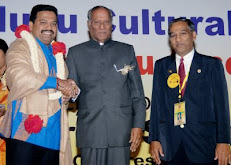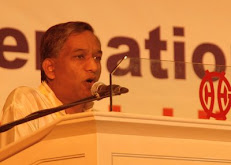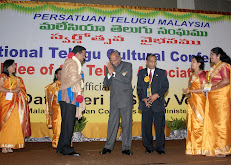By SNV SudhirVisakhapatnam, Sep 5: The common thing apart the language that the Telugus in peninsula Malaysia have is that they all have their roots in the three north coastal Andhra districts. It’s surprising to know that most of the approximate 3 lakh Telugu populate staying in the country since five generations hail from Visakhapatnam, Vizianagaram and Srikakulam districts. Various researches done by some enthusiasts of Telugu speaking people in the country revealed the fact and every Telugu person in Malaysia strongly believe this. Indians constitute seven percent of the population with Tamilians in the lead followed by Telugu, Malayalam and Punjabi speaking people in Malaysia. “The slang used by the Telugus is of typical north Andhra Vizag style to indicate that most of them are from the same region” says Adari Appala Naidu, a 56 year old belonging to the third generation who born and brought up in Malaysia and currently residing in Kuala Lumpur. Naidu who held various positions in the ministries of Trade, Information and Prime Minister’s Office of Malaysia says that the immigrants to Malay who came to work in the rubber or palm plantations in the late 19th Century or early 20th Century hailed mostly from rural areas of north Andhra coastal districts. The lure of steady employment and possible riches in the far Malay pulled many illiterate agricultural laborers into becoming immigrants, says a research paper that was submitted by the Appala Naidu to the University of Malaya as part of his thesis work on sociology and development. He also presented this paper at the International Telugu Cultural Conference and Golden Jubilee of the Telugu Association of Malaysia held on from March 3 to 5, 2006 at Genting highlands in Malaysia. Speaking to this Correspondent from Kuala Lumpur Adari Appala Naidu said that he has been involved with the Telugu Association of Malaysia since his youth as his father was a Telugu school teacher and was the founder member of the Telugu Association which was formed in 1956. “I have attended many Telugu gatherings and meetings personally and know significant number of Telugus here. I have also been personally to most of the estates where Telugus have lived. During the course of meetings and discussions I got the knowledge that majority of Telugus originated from the Port city of Vizag and surrounding areas. I have also collected detailed statistics from the government of Malaysia about the immigrants,” said Naidu whose ancestors belong to Anakapalle. A research conducted by the Professor Emeritus of the Andhra University, Prof Eswara Venkata Gangadharam also says that most the Telugus migrated to Malaysia belonged to the North Andhra districts and embarked the British ships at the Baruva seaport in Srikakulam. “The two big poles near the shore at Baruva indicated that there was a sea port and according to the recordings of the oldtimers it was revealed that from 1895 to 1920 and 30 there was a huge embarkation from the seaport at Baruva.” said Gangadharam who did the research ‘Study of Baruva as departure port for migrants of Malaysia’ as part of the UGC project named “Maritime history of Andhra Pradesh 2002-05”. Apart from the roots another interesting thing is that the Telugus done a lot to preserve the language. Telugu is taught as "Peoples Own Language" (POL Classes) up to the secondary school level in areas where Telugus predominantly live. At present there are two government schools where Telugu is taught and they are located at Bagan Datoh area. At the secondary school level, a class to teach Telugu is organized if more than 15 students demand teaching of Telugu as a subject. Telugu is not taught as a subject at the University level. The fourth generation Telugus excelled in education, and was well endowed with better living and educational conditions. This is a proud generation for Telugus in Malaysia. “With the fourth generation, we can easily say that there are an estimated 500 Doctors, 250 lawyers, 250 Engineers, 150 IT graduates and another 2000 with degrees in various fields. The fourth generation Telugus though have progressed academically and financially, it cannot be denied that their love and allegiance towards their language and culture is not as intense as the first, second and third generation of Telugus. We do not see the fourth generation Telugus participating in Telugu activities with such enthusiasm as the previous 3 generations,” said Appala Naidu. This is partly because of their up-bringing in urban multi-racial environment. Added to this, urban living had not provided many opportunities for Telugu gatherings except at marriages and some Telugu Association functions, Naidu lamented. “It is now a great challenge for Telugu association to bring the fourth generation educated Telugus to their fold and make them members and leaders of the Association and ensure they speak and read Telugu and appreciate their own language and culture” says Appala Naidu. There were also others like D V Sreeramulu, ex secretary general of the association and Mrs Buloka Rao Didi and many others also strongly believe that they all have their roots in north Andhra. “I wonder how Telugus who have migrated to Malay four generations ago kept the Telugu language alive and at the same time I wonder how the Telugu speaking people in America are unable to come to grips about teaching Telugu to their children” said Dr Satyanarayana Gavarasana whose article “Telugu in Malaysia” published in the ‘America Bharathi’, Magazine of American Telugu Association. “My fore fathers are also from Gopalapatnam in Vizag. And most of us are from Vizag and surrounding areas only” said Adduri Venkatesulu the Vice President of the Telugu Association of Malaysia. The Telugu Association of Malaysia (TAM) has also embarked on an ambitious project to construct a Telugu Saamskruthika Nilayam in an area covering 2.5 acres, located north of Rawang town to preserve the Telugu language and culture in Malaysia.
Posted by SNV Sudhir at
2:47 AM 4 comments:
mycurries said...
Thank you so much for writting some interesting facts about Telegus of Malaysia.Somu Naidu was one of the 2 founding members of Andhra Association of Malaysia which was subsequently changed to Telegu Association of Malaysia.He was also the Secretary General for many number of years.To learn more and see Andhra Govt recognised his valuable contributions.Check...Source: The Hindu (http://www.hinduonnet.com/2007/06/03/stories/2007060308080400.htm)Andhra PradeshMe being the first Telegu launching world's first social networking site soon....Check www.oleworld.comDr Radha Krishna.
August 17, 2008 2:29 AM Karl Naidu said...
My Late Grandfather Mr. Kuppen Gurusamy Naidu (K.G.Naidu) was the"Commissioner for labour Johore" During the British occupation and Japanese Occupation. He left Malaysia and when back to Andhra after Independence.He was friends with the Sultan of Johor and was a very well respected man.
August 22, 2008 3:58 AM SCM Guru said...
I am thrilled to read this. Below is an interaction that I had with a Malay Telugu, which all Telugu's must read to feel proud of Malay Telugus for keeping the language alive even after 5-6 generations.In one of my visits to Singapore I met this telugu speaking waiter at Komala vilas hotel on Sarngoon Road. His name is Appa Rao. During the conversation I could never realize that he is a citizen of Malaysia and never visited India, his Telugu was so pure and of the Viznaaram accent. It was only when we were leaving, he mentioned that he is from a place called Telugasan in Malaysia (which I could not find on internet) and he doesnt know from where his fore-fathers hailed from.My excitement further grew when I heard this as his Telugu is as pure as the Telugu from Vizag, Vizianagaram area. Then I told him that his fore-fathers must be from Vizag, Vizianagaram area as his telugu accent is at lest 15+ year old accent of that area (which by now must have changed a lot).I am grately
November 2, 2008 4:39 AM SCM Guru said...
just to complete me previously posted comment.I am greatful to the leaders like Mr.Naidu for their great support this ancient langauge which I love.
November 2, 2008 4:40 AM Post a Comment



.jpg)
.jpg)
.jpg)
.jpg)
.jpg)

